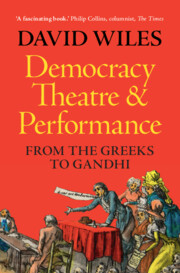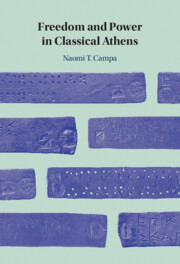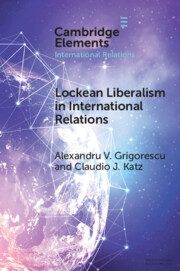499 results
4 - Who Constitutes Power?
-
- Book:
- Radically Legal
- Print publication:
- 06 June 2024, pp 71-102
-
- Chapter
-
- You have access
- Open access
- HTML
- Export citation
2 - Theory, Methods, and International Organizations
-
- Book:
- International Organizations
- Published online:
- 17 May 2024
- Print publication:
- 06 June 2024, pp 17-43
-
- Chapter
- Export citation

Democracy, Theatre and Performance
- From the Greeks to Gandhi
-
- Published online:
- 17 May 2024
- Print publication:
- 27 June 2024
Chapter 14 - Science in Argentine Literature
- from Part II - Critical Inroads
-
-
- Book:
- A History of Argentine Literature
- Published online:
- 09 May 2024
- Print publication:
- 16 May 2024, pp 216-231
-
- Chapter
- Export citation
John Stuart Mill on the Suez Canal and the limits of self-defence
-
- Journal:
- International Theory , First View
- Published online by Cambridge University Press:
- 16 May 2024, pp. 1-26
-
- Article
-
- You have access
- Open access
- HTML
- Export citation
Toward A (Not The) Political Philosophy Of Populism: Democracy, Moral Dualism And Minimalst Theory In Christopher Lasch
-
- Journal:
- Canadian Journal of Political Science/Revue canadienne de science politique , First View
- Published online by Cambridge University Press:
- 10 May 2024, pp. 1-20
-
- Article
-
- You have access
- Open access
- HTML
- Export citation
Partisan of the Absolute State: Arnold Ruge, Liberalism, and the Hallische Jahrbücher
-
- Journal:
- Central European History , First View
- Published online by Cambridge University Press:
- 06 May 2024, pp. 1-22
-
- Article
-
- You have access
- HTML
- Export citation
Religion as Liberal Politics
-
- Journal:
- Journal of Law and Religion , First View
- Published online by Cambridge University Press:
- 29 April 2024, pp. 1-22
-
- Article
- Export citation
2 - The Metropolitan Inns
-
- Book:
- Brotherhood of Barristers
- Published online:
- 11 April 2024
- Print publication:
- 18 April 2024, pp 19-51
-
- Chapter
- Export citation
Chapter 1 - Introduction
-
- Book:
- Freedom and Power in Classical Athens
- Published online:
- 04 April 2024
- Print publication:
- 11 April 2024, pp 1-17
-
- Chapter
- Export citation
Chapter 6 - Conclusion
-
- Book:
- Freedom and Power in Classical Athens
- Published online:
- 04 April 2024
- Print publication:
- 11 April 2024, pp 166-174
-
- Chapter
- Export citation
Chapter 13 - Liberalism and Landscape
- from Part III - Culture and Society
-
-
- Book:
- Vaughan Williams in Context
- Published online:
- 28 March 2024
- Print publication:
- 04 April 2024, pp 112-118
-
- Chapter
- Export citation

Freedom and Power in Classical Athens
-
- Published online:
- 04 April 2024
- Print publication:
- 11 April 2024
Recovering the Dalit Public Sphere: Vernacular Liberalism in Late Colonial North India
-
- Journal:
- Comparative Studies in Society and History , First View
- Published online by Cambridge University Press:
- 01 April 2024, pp. 1-26
-
- Article
-
- You have access
- Open access
- HTML
- Export citation
39 - A Pragmatic Approach to Ethics in Education
- from Part III - Emerging Ethical Pathways and Frameworks
-
-
- Book:
- The Cambridge Handbook of Ethics and Education
- Published online:
- 07 March 2024
- Print publication:
- 14 March 2024, pp 821-845
-
- Chapter
- Export citation
15 - Why Educate?
- from Part II - Ethics and Education in Practice
-
-
- Book:
- The Cambridge Handbook of Ethics and Education
- Published online:
- 07 March 2024
- Print publication:
- 14 March 2024, pp 305-329
-
- Chapter
- Export citation

Lockean Liberalism in International Relations
-
- Published online:
- 13 March 2024
- Print publication:
- 04 April 2024
-
- Element
- Export citation
1 - Modernizing the Rule
-
- Book:
- Who Is a True Christian?
- Published online:
- 04 January 2024
- Print publication:
- 22 February 2024, pp 43-82
-
- Chapter
- Export citation
Chapter 13 - Reimagining Society
-
-
- Book:
- Nineteenth-Century Literature in Transition: The 1860s
- Published online:
- 01 February 2024
- Print publication:
- 08 February 2024, pp 238-253
-
- Chapter
- Export citation
The Promise and Peril of the Popular: Interpretations of Nineteenth-Century Popular Liberalism in Mexico
-
- Journal:
- Journal of Latin American Studies / Volume 56 / Issue 1 / February 2024
- Published online by Cambridge University Press:
- 12 February 2024, pp. 137-160
- Print publication:
- February 2024
-
- Article
- Export citation



